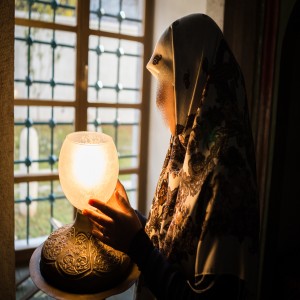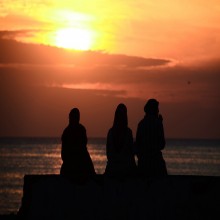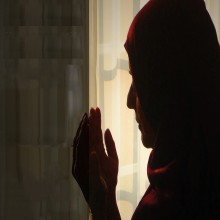“The believers, men and women, are protectors, one of another. They enjoin what is right, and forbid what is wrong, They observe regular prayers, pay regular charity, And obey God and His Messenger. On them will God pour Mercy, for God is Exalted in power, Wise.”
“If this is Islam, I told myself, I want it. I want to be a part of this generosity, this empathy. I will join this faith with all my heart.”
Lauren Booth, British journalist, sister-in-law of Tony Blair, the former Prime Minister of Britain interviewed by Hasan Rahim for The American Muslim. She accepted Islam in 2010.
"It's (referring to the Koran) a magna carta for women!" “The Koran makes it clear that women are equal in spirituality, worth and education. What everyone forgets is that Islam is perfect; people are not."
Yvonne Ridley, British journalist in "A Muslim in the family" BBC News, May 1, 2004 & "Articles of faith" The Guardian, February 24, 2004. She accepted Islam in 2003.
“True Islam is very different from its picture painted in the media (or the ugly distortions by certain extremists). It is not only my personal interpretation that is different. Anyone who takes the time to do serious research (reading books and speaking to Muslim scholars not just browsing the internet) with an open heart and mind will discover its profundity, and will see the truth in its spiritual and ethical teachings.”
Kristiane Backer, a German television presenter, television journalist and author residing in London, in an interview with William Dobson 3rd Sep 2012
The issue of women in Islam is greatly misunderstood. The West has stereotyped Islam as anti-women. In fact, the opposite is true. In the eyes of many Westerners, Muslim women are hidden behind negative stereotypes that portray them as either oppressed, subservient wives and daughters or, more recently, as potential terrorists.
Since ancient times women were abused and mistreated. In some cultures they were considered property that could be bought, sold, or inherited! Considered inferior to men, they were blamed for misfortune. Their only purpose was to please men. Before Islam, women in Arabia did not do any better. A harbinger of shame to the family, girls were sometimes buried alive at birth!
Islam, as a faith, elevates the status of women in society and advocates their rights. Men and women serve different, but equally important roles in the society and a family. They are in a mutual relationship, both have corresponding rights and are equal in the sight of God. Here is some of what the Quran has to say about women:
(Quran 9:71–72)
And their Lord answered them:
Truly I will never cause to be lost the work of any of you,Be you a male or female, you are members one of another
Quran 3:195
For Muslim men and women, for believing men and women,For devout men and women, for true men and women,For men and women who are patient,for men and women ,Who humble themselves,For men and women who give in charity, for men and women who fast,For men and women who guard their chastity,And for men and women who engage much in God’s remembrance —For them God has prepared forgiveness and great reward
Quran 33:35
As can be seen, the Quran views woman as spiritually equal to men. Both are God’s creatures whose purpose is to worship God, do righteous deeds, and avoid evil. On one occasion,
the Prophet of Mercy told his followers
Women are the twin-halves of men
Reported by Abu Daud
meaning neither is complete without the other. It takes both to make a whole.
The equality of men and women in Islam goes back to the creation of Adam and Eve and their description in the Quran. Muslims believe that Adam and Eve were not created identical, but made to complement each other. The Bible describes Eve as a temptress who enticed Adam to disobey God. But, according to the Quran, both Adam and Eve disobeyed God, both recognized and repented from their mistake, and God forgave both of them. Thus, Eve was not solely to be blamed. Unlike the Biblical teaching, menstruation and childbearing are not punishment from God on every woman for Eve’s disobedience. They are simply part of a women's nature, the way God created women to play her role in the human family.
Islamic history provides Muslim women with successful role-models. Khadijah, the first wife of the Prophet Muhammad, was a successful business woman. In the early phases of the mission of the Prophet of Islam, women suffered persecution, exile, and martyrdom along with men. The early battles that threatened the very existence of Islam saw women nursing the injured, running supplies, and in some occasions, participating in the fighting. There is a strong academic tradition of Muslim women who look up to the earliest female scholars like Aisha and Umm Salama.
In the seventh century, Islam gave women rights and freedoms that have only been recently gained in the West. Historically, France gave women the right to own property only in 1938. American women won the right to vote in 1920. Gender inequality is still a hotly debated issue in the US. Traditional Islamic law provides hundreds of provisions for women’s rights including:
- A woman’s property is her own and cannot be seized by her husband
- Women cannot be denied the right to education
- Ruining a woman’s reputation is a punishable offense
- A woman cannot be forced into marriage
- Women can file legal suits and testify in court
- Women can freely enter into contracts
- Spousal abuse is a punishable offense
- Women can seek divorce from their husbands
- Women receive equal pay for work
- A Muslim woman retains her own family name upon marriage, rather than taking the name of her husband. This symbolic act emphasizes that she remains her own person, with her own valid identity separate from that of her husband
Unfortunately, Muslim societies do not live up to these ideals. Today, women’s rights vary widely in the Muslim world, reflecting a great variety of cultures and range of modernization and economic development in Muslim nations. Culture and traditions often interfere or even overshadow the faith's true teachings. In some instances, local practices have no justification in the faith or violate the faith's teachings altogether like honor killings, female genital mutilation, and forced marriages.






